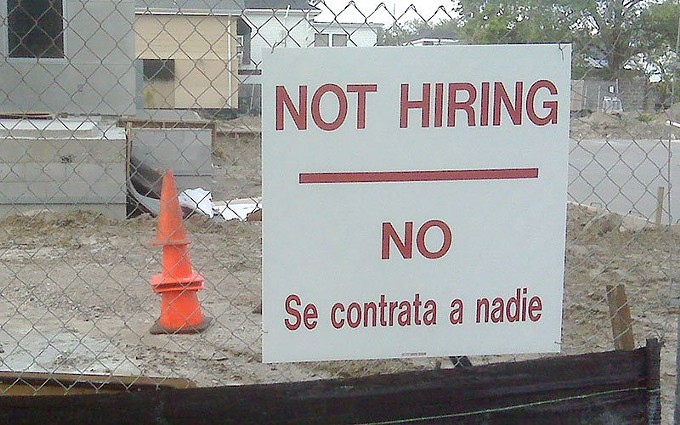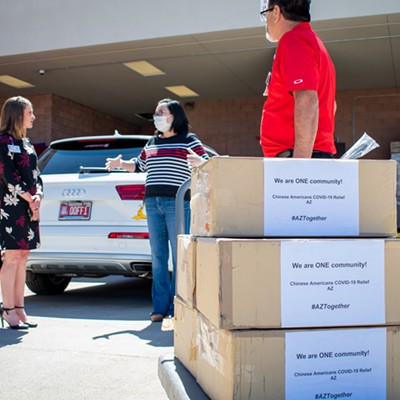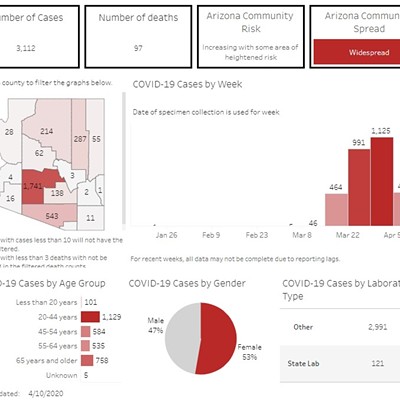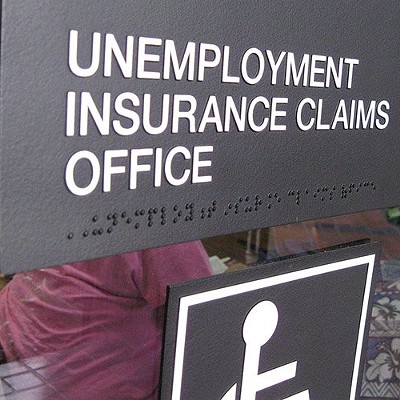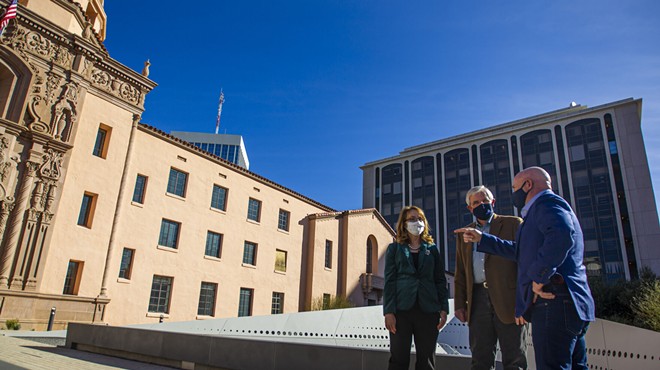Friday, April 10, 2020
State, national jobless claims continue surge, experts see no end
PHOENIX – Another 129,215 Arizonans filed for unemployment last week, boosting the number of new jobless in the state above a quarter million since March 1, according to the latest numbers from the Department of Economic Security.
The Arizona numbers are part of a growing coronavirus-driven loss of jobs that saw more than 16 million Americans register for unemployment in recent weeks, breaking records at both the state and national levels.
Experts said it’s hard to predict when the job losses will stop because this is uncharted territory, but that nothing will improve until the nation gets a handle on COVID-19. Until then, they said, the government may need to step up its efforts – already in the trillions of dollars – to shore up businesses and put more unemployment benefits in Americans’ pockets.
“Congress has already stepped in to supplement state-level unemployment insurance and if the situation necessitates it, then the federal government should be prepared to act once again,” said Garrick Taylor, executive vice president of the Arizona Chamber of Commerce.
The job losses come as efforts to contain the coronavirus have shut down large parts of the economy. Travel restrictions – and travel fears – have hit the airline, hotel and other industries hard, while governors in most states, including Arizona, have banned gatherings of all but the smallest numbers of people and ordered nonessential businesses closed.
The impact on the economy has been swift and severe.
In Arizona, where unemployment claims typically averaged 3,500 a week, new claims jumped to 29,333 three weeks ago and then 88,592 two weeks ago, challenging DES’ ability to process them all. Those were both records, which were shattered again last week when 129,215 new unemployment claims were filed.
A new unemployment rate has not been released but experts said that, based on recent claims, Arizona joblessness has likely at least doubled February’s rate of 4.5%.
Claims have also set records nationally, spiking from 281,000 in mid-March to 3.3 million three weeks ago, then more than doubling to 6.8 million. Another 6.6 million claims were filed across the U.S. last week.
Congress has responded with a series of emergency relief measures, the most recent being the $2 trillion Coronavirus Aid, Relief and Economic Security Act. The CARES Act includes hundreds of billions in loans and aid for businesses, funding to put $1,200 directly into most taxpayers’ wallets and an extension of jobless benefits that will also boost unemployment checks by $600 a week.
“The government at the federal, and the state level, have responded by making unemployment more broadly available,” said George Hammond, an economics expert at the University of Arizona. “The state of Arizona has also waived the requirement that workers who are laid-off have to wait a week to apply for insurance and the federal government has increased the dollar-value of benefits.
“The idea is to give people the financial resources they need to shelter in place and therefore slow the virus,” Hammond said.
But Hammond and others said the government response so far still may not be enough.
Congress is already working on a fourth relief bill.
The Senate failed to act Thursday on a proposal by Majority Leader Mitch McConnell, backed by the White House, that would have added $250 billion to the $350 billion approved last week for the Paycheck Protection Program. That fund, part of the CARES Act, will provide operating loans to small businesses that would not have to be paid back if the money was used to keep workers on payroll through the coronavirus pandemic.
Democrats have balked at the proposal, saying the next relief bill needs to include funding for hospitals and frontline workers as well.
Julia Wolfe, state economic analyst for the Economic Policy Institute, believes the U.S. should follow in the footsteps of European countries that have begun to absorb payrolls of troubled companies.
“The loss of jobs, or the losses of income, are not inevitable,” Wolfe said. “There are other countries that are approaching this in a better way than we are. You can look to the example of the UK or Denmark, where the government is stepping in … as a payer of last resort.”
She said that the government stepping in in that fashion helps workers and businesses and would “do a much better job of freezing the economy in place, so that we can restart it and recover later.”
But Taylor said that while the government may need to do more in the short term, it should not be a permanent fix. “Unemployment is meant to be temporary,” he said.
Experts cannot predict when things might start turning around, but said it will not be until after the U.S. has a handle on the coronavirus. And even then, the effects of business closures and high unemployment might linger in the economy.
“This is not going to be up to the economy, this is going to be up to government officials,” said Dennis Hoffman, director of the Seidman Institute at Arizona State University’s W.P. Carey School of Business. “They are not going to open up the economy until they see signs that the virus is not a threat.
“But this July is not going to look like last July did,” Hoffman said. “People are not going to baseball games, people are not going to be going to concerts, to restaurants, to social gatherings in anywhere near the frequency they did before.”
Follow Cronkite News on Twitter.
The Arizona numbers are part of a growing coronavirus-driven loss of jobs that saw more than 16 million Americans register for unemployment in recent weeks, breaking records at both the state and national levels.
Experts said it’s hard to predict when the job losses will stop because this is uncharted territory, but that nothing will improve until the nation gets a handle on COVID-19. Until then, they said, the government may need to step up its efforts – already in the trillions of dollars – to shore up businesses and put more unemployment benefits in Americans’ pockets.
“Congress has already stepped in to supplement state-level unemployment insurance and if the situation necessitates it, then the federal government should be prepared to act once again,” said Garrick Taylor, executive vice president of the Arizona Chamber of Commerce.
The job losses come as efforts to contain the coronavirus have shut down large parts of the economy. Travel restrictions – and travel fears – have hit the airline, hotel and other industries hard, while governors in most states, including Arizona, have banned gatherings of all but the smallest numbers of people and ordered nonessential businesses closed.
The impact on the economy has been swift and severe.
In Arizona, where unemployment claims typically averaged 3,500 a week, new claims jumped to 29,333 three weeks ago and then 88,592 two weeks ago, challenging DES’ ability to process them all. Those were both records, which were shattered again last week when 129,215 new unemployment claims were filed.
A new unemployment rate has not been released but experts said that, based on recent claims, Arizona joblessness has likely at least doubled February’s rate of 4.5%.
Claims have also set records nationally, spiking from 281,000 in mid-March to 3.3 million three weeks ago, then more than doubling to 6.8 million. Another 6.6 million claims were filed across the U.S. last week.
Congress has responded with a series of emergency relief measures, the most recent being the $2 trillion Coronavirus Aid, Relief and Economic Security Act. The CARES Act includes hundreds of billions in loans and aid for businesses, funding to put $1,200 directly into most taxpayers’ wallets and an extension of jobless benefits that will also boost unemployment checks by $600 a week.
“The government at the federal, and the state level, have responded by making unemployment more broadly available,” said George Hammond, an economics expert at the University of Arizona. “The state of Arizona has also waived the requirement that workers who are laid-off have to wait a week to apply for insurance and the federal government has increased the dollar-value of benefits.
“The idea is to give people the financial resources they need to shelter in place and therefore slow the virus,” Hammond said.
But Hammond and others said the government response so far still may not be enough.
Congress is already working on a fourth relief bill.
The Senate failed to act Thursday on a proposal by Majority Leader Mitch McConnell, backed by the White House, that would have added $250 billion to the $350 billion approved last week for the Paycheck Protection Program. That fund, part of the CARES Act, will provide operating loans to small businesses that would not have to be paid back if the money was used to keep workers on payroll through the coronavirus pandemic.
Democrats have balked at the proposal, saying the next relief bill needs to include funding for hospitals and frontline workers as well.
Julia Wolfe, state economic analyst for the Economic Policy Institute, believes the U.S. should follow in the footsteps of European countries that have begun to absorb payrolls of troubled companies.
“The loss of jobs, or the losses of income, are not inevitable,” Wolfe said. “There are other countries that are approaching this in a better way than we are. You can look to the example of the UK or Denmark, where the government is stepping in … as a payer of last resort.”
She said that the government stepping in in that fashion helps workers and businesses and would “do a much better job of freezing the economy in place, so that we can restart it and recover later.”
But Taylor said that while the government may need to do more in the short term, it should not be a permanent fix. “Unemployment is meant to be temporary,” he said.
Experts cannot predict when things might start turning around, but said it will not be until after the U.S. has a handle on the coronavirus. And even then, the effects of business closures and high unemployment might linger in the economy.
“This is not going to be up to the economy, this is going to be up to government officials,” said Dennis Hoffman, director of the Seidman Institute at Arizona State University’s W.P. Carey School of Business. “They are not going to open up the economy until they see signs that the virus is not a threat.
“But this July is not going to look like last July did,” Hoffman said. “People are not going to baseball games, people are not going to be going to concerts, to restaurants, to social gatherings in anywhere near the frequency they did before.”
Follow Cronkite News on Twitter.
Tags: unemployment , claims , jobless , economy , Image


